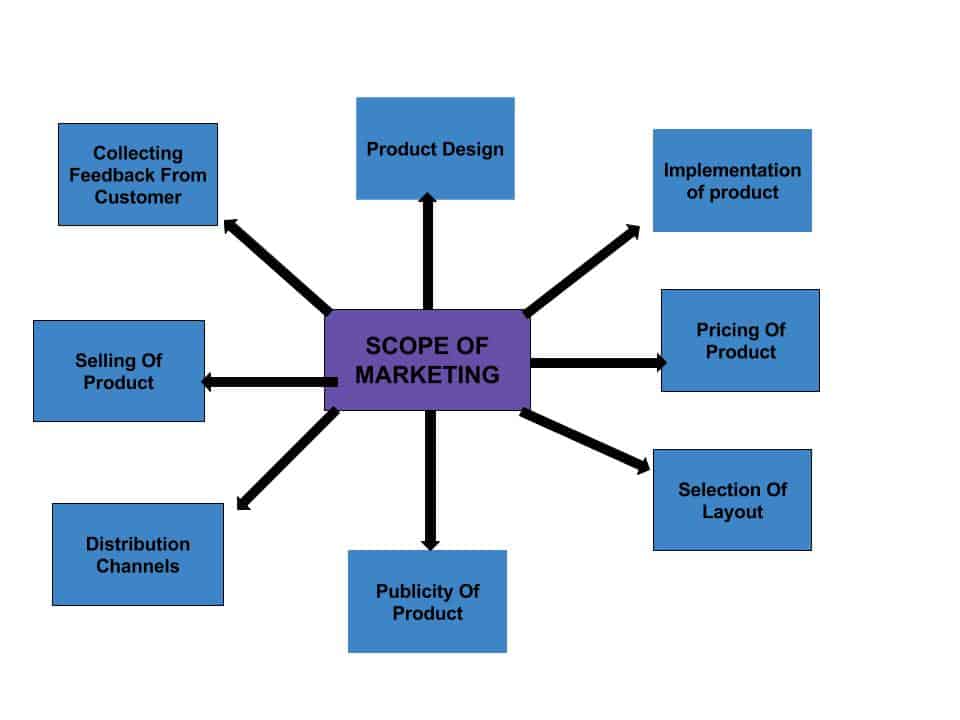Scope of Marketing

The scope of marketing management encompasses a wide range of activities and functions aimed at creating, communicating, delivering, and exchanging value with customers. It plays a central role in driving business success by aligning organizational objectives with customer needs and market opportunities. Here's an exploration of the scope of marketing management, covering its key components and functions:
Product Development: Marketing management plays a crucial role in product development by identifying market needs, conducting market research, and conceptualizing new products or services that meet customer demands. Marketers work closely with product development teams to define product features, specifications, and positioning strategies that differentiate the offering from competitors and appeal to target audiences.
Pricing Strategy: Pricing is a fundamental element of marketing management, as it directly impacts profitability, market positioning, and customer perceptions. Marketers analyze market dynamics, competitor pricing strategies, and consumer willingness to pay to develop pricing strategies that maximize revenue while maintaining competitiveness. Pricing decisions may involve considerations such as cost-based pricing, value-based pricing, dynamic pricing, and promotional pricing.
Distribution (Place): Distribution refers to the process of delivering products or services to customers through various channels and intermediaries. Marketing management encompasses distribution strategy development, channel management, and logistics coordination to ensure efficient and effective product distribution. Marketers evaluate distribution channels, negotiate partnerships with distributors, manage inventory levels, and optimize supply chain processes to enhance product availability and accessibility.
Promotion: Promotion involves communicating the value proposition of products or services to target audiences through various marketing channels and tactics. Marketing management encompasses promotional strategy development, advertising, sales promotions, public relations, direct marketing, and digital marketing efforts to generate awareness, stimulate demand, and drive sales. Marketers craft compelling messaging, creative assets, and integrated campaigns to engage customers and influence purchase decisions.
Customer Relationship Management (CRM): Customer relationship management is a core component of marketing management, focusing on building and maintaining long-term relationships with customers. Marketers leverage CRM systems and tools to collect customer data, analyze customer behavior, and personalize interactions across different touchpoints. By understanding customer needs and preferences, marketers can tailor marketing strategies, offer personalized recommendations, and provide superior customer experiences that foster loyalty and retention.
In addition to these functional areas, marketing management encompasses both strategic planning and tactical execution:
Strategic Planning: Marketing management involves strategic planning to define organizational objectives, assess market opportunities, and formulate marketing strategies that align with business goals. Strategic planning includes conducting market research, analyzing competitive dynamics, segmenting target markets, and developing marketing plans that outline objectives, strategies, and action plans to achieve desired outcomes.
Tactical Execution: Once marketing strategies are formulated, marketing management involves tactical execution to implement marketing initiatives, campaigns, and programs designed to achieve strategic objectives. Tactical execution includes coordinating marketing activities, allocating resources, monitoring campaign performance, and making adjustments as needed to optimize results. Marketers oversee the execution of marketing plans, manage cross-functional teams, and ensure alignment with organizational priorities to drive business success.
Overall, the scope of marketing management is multifaceted, encompassing product development, pricing, distribution, promotion, customer relationship management, strategic planning, and tactical execution. By effectively managing these components, marketers can create value for customers, drive business growth, and achieve competitive advantage in dynamic and competitive markets.
Comments
Post a Comment